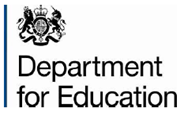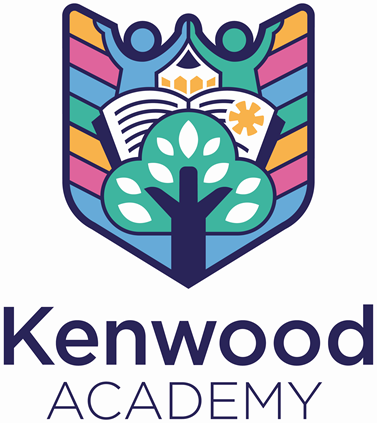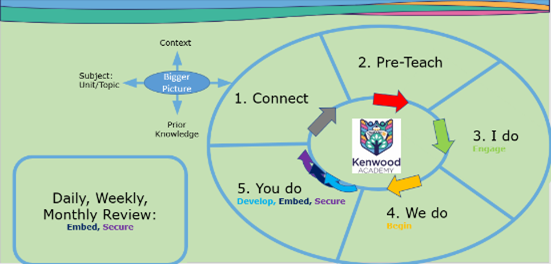Teachers' Standards 1-8: A Kenwood Academy Manifesto
 Teachers make the education of their pupils their first concern, and are accountable for achieving the highest possible standards in work and conduct. Teachers act with honesty and integrity; have strong subject knowledge, keep their knowledge and skills as teachers up-to-date and are self-critical; forge positive professional relationships; and work with parents in the best interests of their pupils.
Teachers make the education of their pupils their first concern, and are accountable for achieving the highest possible standards in work and conduct. Teachers act with honesty and integrity; have strong subject knowledge, keep their knowledge and skills as teachers up-to-date and are self-critical; forge positive professional relationships; and work with parents in the best interests of their pupils.
 At Kenwood Academy, our unique ability to forge positive relationships with students and families in the most challenging of circumstances is at the heart of our success. Our staff are committed to an ethos of reflective practice that fosters vibrant professional working and has pedagogy and subject specialism as a central focus.
At Kenwood Academy, our unique ability to forge positive relationships with students and families in the most challenging of circumstances is at the heart of our success. Our staff are committed to an ethos of reflective practice that fosters vibrant professional working and has pedagogy and subject specialism as a central focus.
1. Set high expectations which inspire, motivate and challenge pupils
DfE:
- Establish a safe and stimulating environment for pupils, rooted in mutual respect
- Set goals that stretch and challenge pupils of all backgrounds, abilities and dispositions
- Demonstrate consistently the positive attitudes, values and behaviour which are expected of pupils
Kenwood:
Our learners will go on to do incredible things. Due to often significant struggles prior to their arrival with us, they don’t always know it yet. A core part of our work involves opening the door to future possibilities and working with individuals to set and support the journey towards ambitious goals.
2. Promote good progress and outcomes by pupils
DfE:
- Be accountable for pupils' attainment, progress and outcomes
- Be aware of pupils' capabilities and their prior knowledge, and plan teaching to build on these
- Guide pupils to reflect on the progress they have made and their emerging needs
- Demonstrate knowledge and understanding of how pupils learn and how this impacts on teaching
- Encourage pupils to take a responsible and conscientious attitude to their own work and study
Kenwood:
Progress at Kenwood Academy takes many forms. A young person who can engage in a learning space after up to two years out of education reflects incredible progress and the resulting pathway this puts learners on can and does change lives. Our broad and ambitious spiral curriculum design ensures that, once a learner is ready to access our offer, the sky is the limit.
3. Demonstrate good subject and curriculum knowledge
DfE:
- Have a secure knowledge of the relevant subject(s) and curriculum areas, forster and maintain pupils' interest in the subject, and address misunderstandings
- Demonstrate a critical understanding of developments in the subject and curriculum areas, and promote the value of scholarship
- Demonstrate an understanding of and take responsibility for promoting high standards of literacy, articulacy and the correct use of standard English, whatever the teachers' specialist subject
- If teaching early reading, demonstrate a clear understanding of systematic synthetic phonics
- If teaching early mathematics, demonstrate a clear understanding of appropriate teaching strategies
Kenwood:
Subject specialism is at the heart of our provision. Passionate and knowledgeable leaders have designed ambitious curricula that make best use of all available evidence to create a generative, ambitious spiral curriculum design that supports our learners to develop into citizens of the future who will secure success and happiness in their: Identity and Independence, Health, Communities and Friendships, Education and Employment. Leaders and their teams have a committed approach to reflective practice and improvement and look outwards to ensure our curriculum has varied network connections so we can benefit from (and share our own) great practice.
4. Plan & teach well structured lessons
DfE:
- Impart knowledge and develop understanding through effective use of lesson time
- Promote a love of learning and children's intellectual curiosity
- Set homework and plan other out-of-class activities to consolidate and extend the knowledge and understanding pupils have aquired
- Reflect systematically on the effectiveness of lessons and approaches to teaching
- Contribute to the design and provision of an engaging curriculum within the relevant subject area(s)
Kenwood:
Consistent approaches to pedagogy and planning connect colleagues and students across subject specialisms and curriculum phases. We follow an evidence-informed 5-step approach: Connect/ Pre-teach / I do / You do / We do which has embedded generative learning and metacognitive principles:

5. Adapt teaching to suit strengths & needs of all pupils
DfE:
- Know when and how to differentiate appropriately, using approaches which enable pupils to be taught effectively
- Have a secure understanding of how a range of factors can inhibit pupils' ability to learn, and how best to overcome these
- Demonstrate an awareness of the physical, social and intellectual development of children, and know how to adapt teaching to support pupils' education at different stages of development
- Have a clear understanding of the needs of all pupils, including those with special educational needs; those of high ability, those with English as an additional language, those with disabilities; and be able to use and evaluate distinctive teaching approaches to engage and support them
Kenwood:
Learners at Kenwood Academy are expertly supported by a staff team with rich and extensive understanding of adaptive teaching. Teachers and Teaching Assistants work closely with our SENDCO, Learning Mentor and Safeguarding teams to ensure learners have adapted and appropriate conditions resulting in the most effective learning experience. Kenwood Academy’s adapted environment and use of space, biophilic design and innovative engagement with technology allow learners to benefit from unique and inspiring approaches to differentiation and meeting individual needs.
6. Make accurate & productive use of assessment
DfE:
- Know and understand how to assess the relevant subject and curriculum areas, including statutory assessment requirements
- Make use of formative and summative assessment to secure pupils' progress
- Use relevant data to monitor progress, set targets, and plan subsequent lessons
- Give pupils regular feedback, both orally and through accurate marking, and encouraging pupils to respond to the feedback
Kenwood:
Our curriculum is designed with the most ambitious end points in mind. Crucially, though, our learners will engage with the most appropriate curriculum based on their starting points and at the most appropriate pace for their needs. We use formative and summative assessment approaches embedded within our system of assessing progress. Teachers and Teaching Assistants use a range of questioning and feedback methods to ensure learners get a clear sense of their strengths and their next steps and are supported to respond and develop their knowledge.
7. Manage behaviour effectively
DfE:
- Have clear rules and routines for behaviour in classrooms, and take responsibility for promoting good and courteous behaviour both in classrooms and around the school, in accordance with the school's behaviour policy
- Have high expectations of behaviour, and establish a framework for discipline with a range of strategies, using praise, sanctions and rewards consistently and fairly
- Manage classes effectively, using approaches which are appropriate to pupils' needs in order to involve and motivate them
- Maintain good relationships with pupils, exercise appropriate authority, and act decisively when necessary
Kenwood:
All behaviour is communication. At Kenwood Academy we do incredible work to maintain very strong relationships with learners and their families. Our staff are resilient and skilled in working with learners who, at times, are significantly dysregulated. Our person-first approach means that individuals can access high levels of support to re-engage with learning as soon as they are able to. Our ‘Connect-first’ approach to the curriculum always seeks to engage learners positively from the outset.
8. Fulfil wider professional responsibilities
DfE:
- Make a positive contribution to the wider life and ethos of the school
- Develop effective professional relationships with colleagues, knowing how and when to draw on advice and specialist support
- Deploy support staff effectively
- Take responsibility for improving teaching through appropriate professional development, responding to advice and feedback from colleagues
- Communicate effectively with parents with regard to pupils' achievements and well-being
Kenwood:
Staff at Kenwood Academy make a daily positive contribution to the wider life and ethos of the school and its families, as well as taking an outward-facing approach to working with others in education and wider partnerships – such as supporting developing teachers on PGCE courses by providing enrichment placements. We are committed to reflective practice and have incredible specialist knowledge to share more broadly, as well as working effectively together within our school.
Systems exist to ensure strong and effective practice is shared and celebrated whilst also ensuring support and challenge is robust. Our person-centred approach extends to the needs of our staff body and leaders are skilled at designing CPD and wider opportunities for development and support to ensure our staff have what they need to work most effectively with our brilliant young people so they can fulfil their potential.
